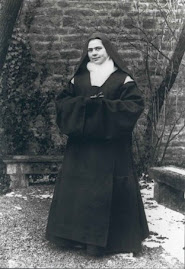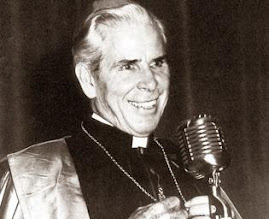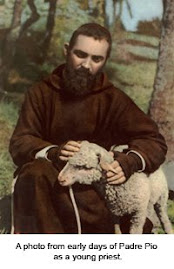

Taken from "Archbishop Fulton Sheen's St. Therese:A treasured love story. Ch. 7, St. Therese, God, and our relationship with Him"
Archbisop Fulton Sheen speaking to a crowd in Ireland:
"My Dear Friends, in this meditation I am going to try to describe to you what it means to be a Christian and what it means to be a saint.
First of all, how did Christ come to be on this earth? Well, one day an angel came out from the great white throne of light and came down to a virgin kneeling in prayer and said to her, "Will you give God a human nature?" When she discovered that she was not to lose her virginity to give God a human nature, she agreed. So God then took from this woman a human nature through which He taught us , He governed us, and He sanctified us.
One day, maybe while we were yet infants, we were called by God and asked, "Will you give Me your human nature?" God wishes to continue the Incarnation. As Mary gave Him a human nature, He continues His Incarnation by us giving Him a human nature. Now this had to happen too to the Little Flower. From her earliest memories, she always wanted to be God's. So she always offered to Him her human nature. Now, not every one of us gives our human nature to God in the same way. She gave hers completely and totally.
Let me give you an example of a pencil. A pencil is very supple and flexible in my hand. If I want the pencil to write the word "God" it will write the word "God". It's totally subservient and obedient to my will.
Suppose, however, this pencil had a will of its own. When I wanted to write the word "God", it might write the word "dog". I couldn't do anything with it. And why? Because the pencil would not be completely obedient to my person. And so, not every one of us gives our human nature to God in such a way that He can use it totally and completely. We hold back!
Now suppose that a number of worldly people read this sermon up to this point. Suppose they saw a picture of this young girl who dies at 24 years of age and are struck by- well, certainly- the purity of her expression and a beauty to which one cannot be totally indifferent. What would the worldly person say about anyone giving oneself so completely to Christ that she writes out a wedding invitation?
They would say it's a waste! Think of the good she could have done in the world! Wouldn't she have been a wonderful wife?! Maybe she could have done social work!
That would have been their argument. But remember that, in the divine order, some lives have to be wasted, wasted from the worldly point of view.
Take, for example, Mary of Bethany. Our Lord was seated at the table in the house of Simon the leper and Pharisee for a banquet to celebrate Jesus' raising her brother Lazarus from the dead. Her sister Martha served the meal. Mary now enters with a jar of costly perfume made from genuine aromatic nard.
She stand over the feet of our Lord. She breaks the vessel of precious ointment. It was a custom very often among Jews to break a vessel of precious ointment over a dead body and then through the remains of glass into the coffin with the body. Well, she breaks this vessel of precious over the feet of our Lord, Jesus, and Judas who was there, sats, "Why all this waste? It could have been sold for 300 denarrii and given to the poor."
Our Lord immediately came to the defense of that waste, saying, "Leave her alone." And because Our Lord was within 10 days of the crucifixion, he added, "She done it for My burial."
In other words, there are certain things in life that we waste; we are seemingly prodigal about them. The Little Flower was that way about her own life, just as this pious woman, Mary, was prodigal about giving the precious perfume.
You see, gold that is hoarded makes one a miser. Knowledge that is selfishly possessed makes one proud. Flesh that is too cared for turns into lust. It is the things that are spent, wasted for God's sake that become remembered through history.
Now I often go out for a walk and I will say to the good Lord, "All right, now use me." Well, He does use me, and it costs me a lot of money generally, but He uses me. I'll run into people who need it badly or someone who is sick. But we have to offer ourselves as pencils. Let Him write poetry. Let Him write prose. Let Him scribble. What difference does it make? This is happiness!
Thank you Servant of God Fulton Sheen for your God-given wisdom!
Now, will you offer yourself as a pencil for our Lord today? Let Him use you as He sees fit!
God bless and protect you!
~Erin






































